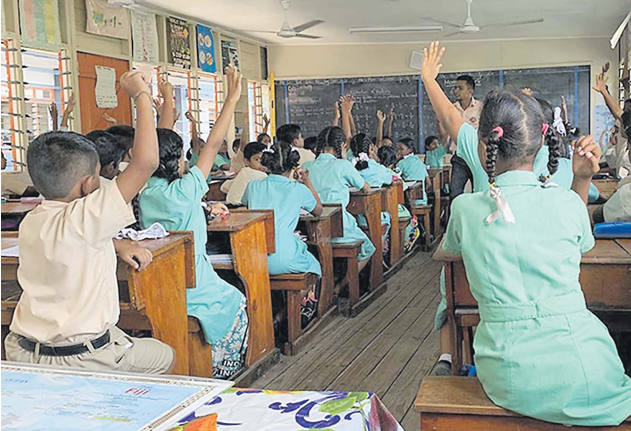TEACHING doesn’t end for parents once their child starts school.
This was the key message from Indian mentor and author Mayur Kalbag, who said parents play a lifelong role in shaping their children’s values and learning beyond the classroom.
Kalbag said that the foundation of education begins long before a child enters formal schooling, often within the family itself.
“Even before the child is put into a nursery, the first set of teachings are inculcated by the parents and grandparents,” he said.
“The role of the parents, either of them, the mother or the father, is extremely important.”
He stressed that a parent’s responsibility should not end with asking about exams or arranging private tuition but should extend to active involvement in a child’s moral and personal growth.
“It is time that parents reinforce their role as teachers.
“When the child comes back from school, the education should continue at home, not in the same way, but through inculcating value systems.”
Kalbag explained that while teachers are responsible for academic instruction, parents should focus on developing a child’s values and ethics.
“There is a difference between teaching and inculcating.
“Parents should inculcate; teachers should teach. Inculcation can be a subset of teaching for teachers, but for parents, inculcation is the superset.”
He added that when both teachers and parents fulfil their roles in harmony, the “corporal aspects from both sides” referring to conflict, stress, and disciplinary issues, would likely decrease.
Kalbag: Cultures should evolve with time
CULTURES should evolve with time and that includes doing away with outdated practices such as physically disciplining children at home or in school.
This was the message from Indian mentor and author Mayur Kalbag who said hitting children as a form of punishment or control had no place in modern society and should be phased out of Fiji’s culture altogether.
Speaking to this newspaper, Kalbag said that societies must be willing to adapt their systems and traditions to changing times.
“Every form of entity, human or otherwise, keeps adapting to change the systems. Cultures have changed, they have evolved,” he said.
“To address the aspect of violence used as a message of authority or discipline in our cultures, it has to change.”
While he acknowledged that indiscipline and rudeness should not be tolerated, Kalbag said that using fear and violence as tools of control could have damaging long-term effects.
“It breeds fear, and fear can come out in ways which are violent and can ultimately drive youth towards substance use because they need some release.”
He stressed that cultural values such as discipline, obedience, and performance should be preserved, but the methods of maintaining them must evolve.
“Cultures need not change, the culture of discipline and obedience can remain, but what has to change is the method of enforcing or maintaining that culture,” he said.
Kalbag said counselling and open communication should replace physical punishment as modern, effective ways of guiding young people.
“Is there any other way of maintaining a good culture or dealing with indiscipline? Yes, it’s called counselling.
“There has to be more two-way communication because that’s today’s culture.”
Author warns on mental punishment
MENTAL punishment has now replaced corporal punishment in schools.
Indian mentor and author Mayur Kalbag told this newspaper that the situation in Fiji’s education system mirrors that in India, with many teachers using insults and demoralising language as a form of
discipline when physical punishment is no longer acceptable.
“Corporal punishment is not only about the physicality of it,” Kalbag explained.
“From an emotional perspective, when a teacher cannot control their anger at a student’s mistake, that anger cannot be expressed physically anymore, so it’s done through insulting and demoralising words.
“And as a student, even that small mistake now becomes a big failure.”
Kalbag said both physical and mental forms of punishment were damaging and needed to be addressed.
He also noted that the mental aspect of discipline is often overlooked, despite its long-term impact on students’ behaviour and relationships outside the classroom.
“So we also need to consider the mental punishment when we talk about corporal punishment.”
Teachers ‘need’ training
FIJIAN teachers should be trained to professionally manage indiscipline in schools.
Indian mentor and author Mayur Kalbag, says teachers were often vulnerable to student misbehaviour, including rudeness and harassment which is evident in Fiji’s education system with cases of student teacher violence rising every year.
He emphasised the importance of sensitising teachers to students’ perspectives and fostering empathy in classrooms.
“At the outset, I think it’s really unpleasantly surprising to see that even teachers have been vulnerable to students kind of being rude to them or even harassed,” Kalbag said.
“There has to be an initiative taken for sensitising the teachers with the students first… the element of empathy has to be restored and strengthened further.”
Kalbag said when students repeatedly fail to meet expectations, teachers may respond with anger, frustration, or harsh words.
He urged that such reactions can be prevented through proper training in empathy and mentorship.
“If you can nip it in the bud there itself before the emotions of anger and frustration awaken, through sensitisation, empathy, and ways by which the teacher is trained to develop the role of mentoring…
empathy and mentoring are very important.”
Kalbag stressed that modern education techniques required teachers to understand students’ perspectives, build trust, and act as mentors rather than relying on punitive measures.



